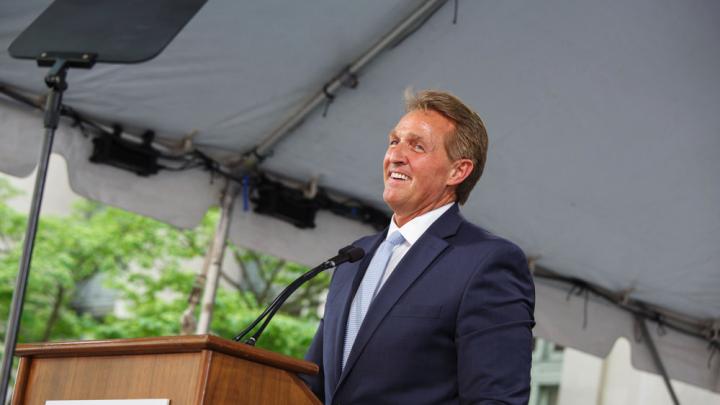In a speech that railed alternately against President Donald Trump and his administration, the “America First crowd,” and fellow members of Congress for lying “utterly supine in the face of the moral vandalism that flows from the White House daily,” Senator Jeff Flake, Republican of Arizona, told the crowd at Harvard Law School’s Class Day that, “simply put: We may have hit rock bottom.”
The career politician, who grew up on an Arizona cattle ranch in a 13-member Mormon family, has become a surprisingly free-talking anti-Trumper. His book, Conscience of a Conservative: A Rejection of Destructive Politics and a Return to Principle, published last year, skewered Trump along with a host of powerful individuals, such as Newt Gingrich, and of those whom Flake, in his speech yesterday, called “malign actors” undermining the independent institutions—namely, a free press and the justice system—and other foundational principles and values upon which American democracy depends: the rule of law and “empirical, objective truth.”
Instead, Flake said, we now have a president with a “bottomless appetite for destruction and division and only a passing familiarity with how the Constitution works,” who “publicly threatens—on Fox & Friends, historians will note—to interfere in the administration of justice,” and this week “ordered an investigation into the investigation of the Russian attack on our electoral process.”
Flake called on the Law School degree candidates to defend those institutions and hard-won “democratic norms.” Do this, he implored, “even if it means risking something very important to you, maybe even your career”—as he himself seems to have done—“because there are times when circumstances may call on you to risk your career in favor of your principles. But you, and your country, will be better for it. You can go elsewhere for a job, but you cannot go elsewhere for a soul.”
Flake was first elected to office as a U.S. representative in 2000, and has held his Senate seat since 2012. In that time, he has led GOP efforts to renew diplomatic relations with Cuba, supported comprehensive immigration reforms, along with the DREAM Act (Development, Relief, and Education for Alien Minors), voted to repeal Don’t Ask, Don’t Tell, and has fostered bipartisan collaboration on a number of issues. Yet he makes no bones about his conservative stance on the limiting the role of government in the economy and individual lives, also voted to repeal Obamacare, is opposed to same-sex marriage and abortion. A graduate of Brigham Young University, where he studied international relations and political science, Flake completed his Mormon mission in Africa. He served as executive director for the Foundation for Democracy in Namibia, then of the Goldwater Institute in Arizona before entering politics.
Flake was one of the few congressional Republicans who stood by his decision not to vote for Trump, and last year, having only sharpened his views, he announced his retirement from the Senate in 2018. (Among those vying for his seat is former Maricopa County sheriff Joe Arpaio, a divisive figure dogged by controversies and allegations, who was convicted of contempt of court and then pardoned by President Trump. Trump and Vice President Mike Pence have priased and supported Arpaio.)
During his speech, Flake alluded to his decision to speak out as a way to “peel off from the herd.” His choice has apparently strained his political relationships and popularity among constituents—and occasioned a lone seat in the Senate dining room. Yet the benefits are immediate: “Your equilibrium returns. Food tastes better. You sleep very well. Your mind is your own again. You cease being the captive to some bad impulses and even worse ideas.”
Flake also clarified that he is still a Republican and a conservative in the more traditional sense of the political frameworks: bucking the president is not act of “apostasy,” but of “fidelity.” He also acknowledged that his stance on the role of government and public policies likely differed from those held by many in the Holmes Field audience. But those differences, he suggested, seem “trivial” given the grave cultural and political crises of the day. He said he supports solutions which are the result of different perspectives and effortful compromise, and that speak to a wider, shared agreement over the more foundational “need to safeguard the health and survival of constitutional democracy in America and the preservation of the American idea itself.”
He urged his audience to monitor their own participation in any herd mentality. Challenge your own assumptions and recognize the good in your opponents, he recommended; apologize and admit to mistakes, as needed, and forgive—and ask for forgiveness, he added. “Listen more. Speak up more.”
“From our time, let us send a message into the future that we did not fail democracy, but that we renewed it,” he urged. “That a patchwork of populist resentments and authoritarian whims that for a while succeeded in its cynical mission of discord had the ultimate effect of shaking us from our complacency, reminding us of who we are and of our responsibilities to each other. Of reawakening us to our obligations as citizens. Let us be able to say in the future that we faced these forces that would threaten the institutions of our liberty and tear us apart and that we said: NO.”








